
statement


On my first trip to India I met and fell in love with a young Kashmiri man named Ashiq Ahmad Dar. A few months after meeting Ashiq we travelled to meet his family, Muslims who have lived for generations in the beautiful yet troubled region of the Hindu-Kush Mountain range of Kashmir.
When I met Ashiq’s family I learned that the process of arranging a marriage for his sister, Waheeda Banu, was about to begin. The ritual intrigued me and became the inspiration for making this film. Upon returning to Germany I managed to gain funding and I enlisted Ashiq as my assistant. For the next three years we filmed the story side-by-side and during all this time, we had agreed to hide our relationship out of respect for his family elders since we were unsure of our future. It was not until we finished shooting the last day of the wedding—and found ourselves still in love -- that we confessed our relationship to Ashiq’s father.
The objective of Arranged Happiness is to present Western audiences with an accurate portrait of the daily life of a devout Muslim family that must balance modern desires with what may appear to us as near inexplicable loyalties to traditional familial customs. It examines the different paths love can take and the challenges that culture can pose. The struggle of the characters in part reflects and is a result of the conflict contained in Kashmir valley, a long-disputed territory between India and Pakistan, where the Kashmiris themselves are innocent people caught amid the tension and violence borne from to cultural and political divides inherent to the region.
I’d come to know Waheeda as a warm, mature and headstrong young woman—the fact that she left the search for her husband and the planning of her marriage completely in the hands of her male relatives challenged my own ideas about what it means to be an independent and modern woman.
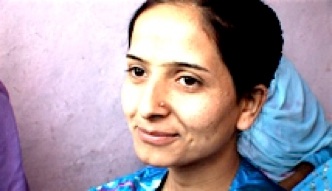
I wondered what lay behind her unwavering deference to the wishes of her elders. Further, I wondered how most of the relationships and marriages in India and other places in the world where marriages are still “arranged” seemed to enjoy sustainability given the contrived circumstances of their unions.
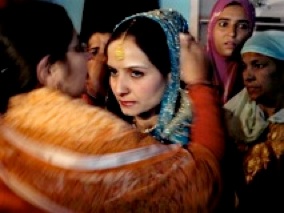
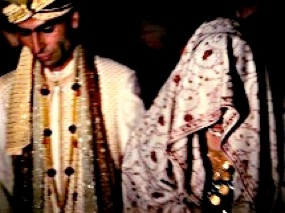
When I asked Waheeda why she didn't take charge of such an important life decision,
she explained that she could trust her family utterly and that since her mother was
dead, there were only male elders left to decide. Who other than those who loved her
most could know what would be best for her? And besides that, God, she said, watches over her, and for that reason she was sure a good husband would be found.
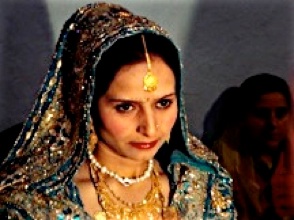

Waheeda on her Wedding Day Fiancée Javid Dar & Waheeda
Two years into our filming, and despite the fact that Ashiq and I had been together secretly for even longer (and in that time I was often living in the home as an additional family member), Ashiq still felt that our relationship would not be accepted by his family.
I realized it wasn’t that the family did not like me. In their eyes, I simply was not an appropriate candidate. A marriage with a Western woman meant they would lose their only son to another world--one in which he might eventually prefer to live in.
The Dar family’s sustainability and safety is built on the support and the growth of family members. Without this established social net, an ailing father like Mohammad Iqbal, who has no health care nor a pension to retire with, will find himself left alone after all the daughters have been given away.
Father Iqbal was not expecting me, a woman from the West, to move in, do housework and care for him. But I knew he expected his son to be a ‘good’ son. And a good son was expected to marry his father’s choice. His reaction was startling to me. He gave us his blessing to marry but under the one condition: Ashiq must marry a second wife in Kashmir.
At the end of filming Ashiq and I are left trying to satisfy Iqbal’s desires without abandoning our own.
–– Daniela Dar-Creutz
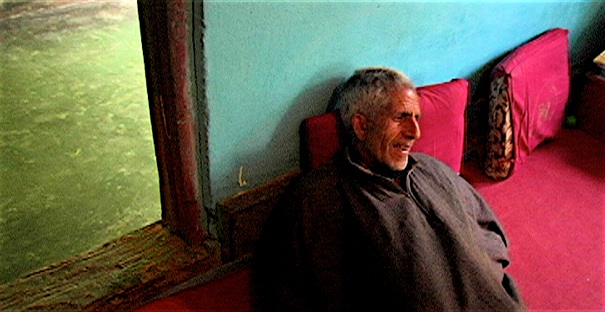
Father, Mohammad Iqbal Dar

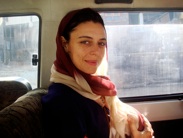

Barbed wire at mosque Director: Dany Creutz-Dar Ashiq w. Indian soldier
Lake Dal with Shikara

The Dar Family: (from right: Ashiq, Wedding-Agent, mid: Waheeda, above: nephews and younger sister Masrat.
Waheeda Dar
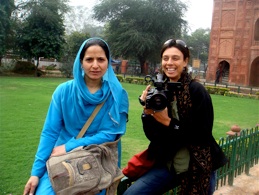
Waheeda with director Dany Creutz-Dar
Waheeda’s good bye from her family
Groom and Bride leaving





























































